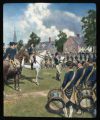
Savannah, Georgia, the United States of America
August 20th, 1778
Tsiyu Gansini, or Dragging Canoe, waited patiently for the "Americans" to arrive in order to begin negotiations. Truthfully, he loathed meeting with the white devils that he had fought just over a decade ago. Sure, these new whites were no longer "English," but "Americans" and acted more "properly." However, dealing with them peacefully left a bad taste in his mouth. After all, there was no reason to believe that the "Americans" would keep their words and treat them as equals. For all he knew, this "United States" was pretending to be peaceful and cooperative until they were prepared to swarm his tribe and the tribes in the north. But he had promised to Skigausta that he would attempt to negotiate with the Americans as peacefully as possible, so he held down his true thoughts and maintained an impassive face.
After a few minutes of waiting, the American delegation finally arrived at the designated meeting place. The meeting place was just outside the town of Savannah and in an open field, which was to deter either side from hiding troops or ambushers nearby. A group of Native American warriors, acting as Dragging Canoe's guards, watched tensely as a lone American man sat in front of the Native American representative. He was also accompanied by a number of troops, all of them being ordinary soldiers from the Continental Army. Dragging Canoe eyed them cautiously and imagined how he would take them down if a fight broke out between the two sides.
The American man, a statesman by the name of James Madison, smiled, "O'-Si-Yo'."
Dragging Canoe was surprised, but hid his emotions, "Greetings."
"I'm sure you have already received our terms through your Chief," Madison stated, "I am open to hearing your thoughts and suggestions to negotiate a peaceful and fair settlement between the United States and the tribes in this region."
"What is your aim with our tribes?" Dragging Canoe asked pointedly.
To the man's credit, Madison did not falter from the question, "Our hope with Cherokee, the Chickasaw, the Seminole, the Creek, and the Choctaw is to have them join the Union as equal citizens while maintaining their autonomy."
"So you wish to integrate us and turn us into white men."
"No, our wish is to ensure that your tribes maintain their cultures while also becoming a part of the United States. While it may seem odd, the United States is striving to become a nation that is inclusive to all. The Iroquois is already considered one of the founding states and is willingly participating in our government. We hope that your tribes may do the same."
The Native American frowned, "But you wish for the Five Tribes to move back to our original homeland and give up territories elsewhere."
Madison nodded, "Admittedly, there have been many debates about allowing all five tribes to become separate states and claim large chunks of territories. As it stands, we wish for the five tribes to adopt a similar model to that of the Iroquois and form one single state in your homeland. So the central and eastern parts of the Tenessee Territory and the southern parts of the Kentucky Territory."
"And you want us to just give up our lands as simple as that?"
"Of course not. There will be proper compensation, as mentioned in the documents we sent to your respective tribes. The United States government will also aid the tribes in moving into the proposed state "Hisgi." Any loss of property or possessions will also be compensated. Additionally, you will be able to maintain your current tribal culture and your warriors, as long as the tribes elect and appoint federal representatives and judges. As guaranteed in our Constitution, the state will never be forced to cede any land once incorporated into the United States and will be protected like all the other states."
Dragging Canoe grunted, "Is that all?"
"That would be the extent of our offer. We can provide more for the tribes if they are still hesitant about the matter."
"Why should we join with your nation, when we can create our own and keep our current territories and possessions?"
"A good question," Madison said as he thought for a few moments, "In short, the five tribes are surrounded by our new nation and while I do not want to sound antagonistic, the two sides may have conflict in the future if the relationship between the two is not settled early on. Also, there are no guarantees that the British will simply watch from the sidelines. It is entirely possible that they attempt to invade the continent in the future, especially since we have received news that they are achieving victories in the Caribbean. On top of that, we offer economic and military support to protect the tribes and help them flourish despite our history."
"I have no guarantees, but I will send some of my warriors to report back to the First Beloved Man of the tribe and further negotiate. Keep in mind, I am merely representing one of the five tribes. You will need to convince others as well."
"Then I sincerely hope that all of them are receptive to our offer," Madison replied.



War of 1812 is imminent
Beautiful









